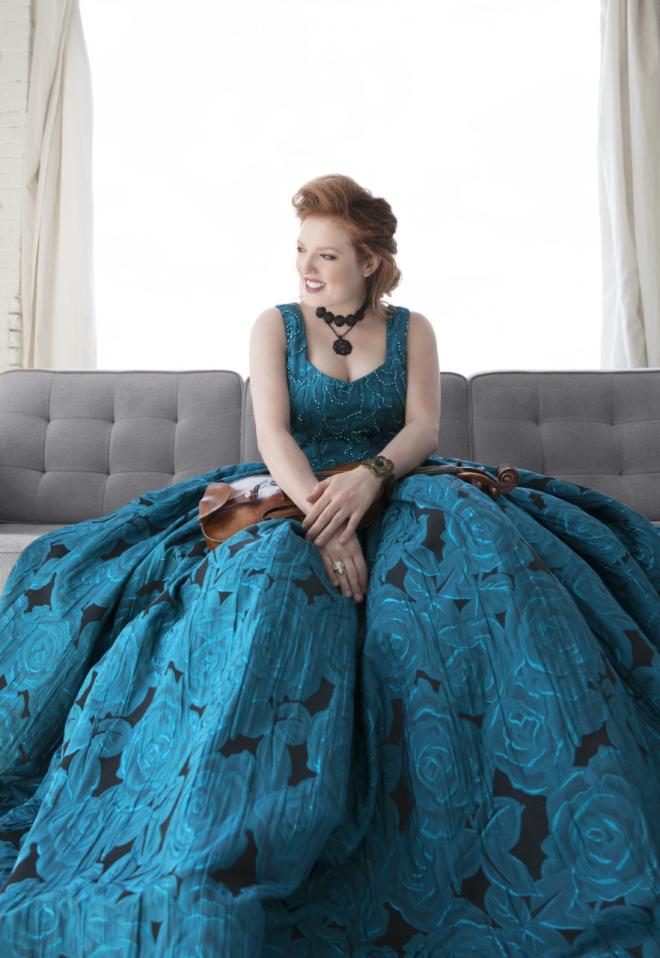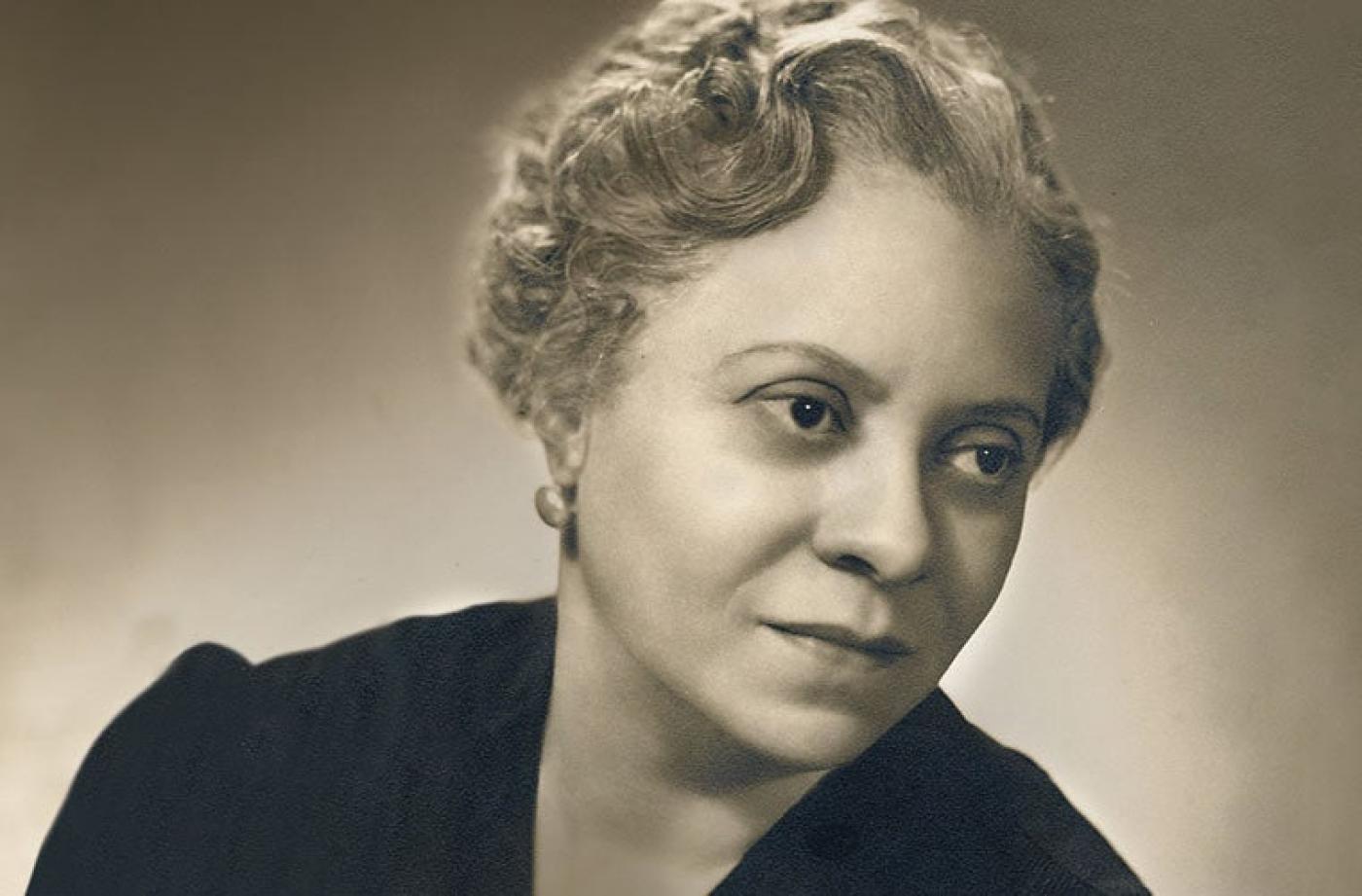Violinist Rachel Barton Pine will be featured with the Fairfax Symphony performing Florence Price's Violin Concerto No. 2 in a concert on February 11 at the Center for the Arts at George Mason University. I reached out to her to ask about this performance and its place in the context of her career.
Evan Keely: You’ve had a long relationship with Cedille Records. Tell us about that, and the genesis of the 1997 album Violin Concertos by Black Composers of the 18th and 19th Centuries (and its 25th-anniversary counterpart, Violin Concertos by Black Composers Through the Centuries).
Rachel Barton Pine: When I was new on the scene back in 1996, Jim Ginsburg – the founder of Cedille Records and my longtime producer, who is Ruth Bader Ginsburg’s son – approached me after one of my performances and said that it would be great to start working together. My career was still in such an early stage that I didn't yet feel quite ready to record the major concertos. Of course, since then, I've recorded all the most popular ones including Brahms, Beethoven, Bruch, and Mendelssohn. But to start with, we wanted to do something that was more repertoire-oriented – where people might buy the album, even if they hadn’t yet heard of the soloist.
What came to mind first was a concerto that I had performed back in 1992 when I was 17, as concertmaster of the Chicago Symphony's training ensemble, the Civic Orchestra of Chicago. It was a recently rediscovered concerto by a composer from France, who was thought to have been of African descent. It hadn't been performed since the 1700s, and this was its modern-day premiere. It’s an absolutely charming concerto, so I thought it would be a good piece to include since it had never been recorded.
Having grown up in Chicago, I was familiar with a facility called the Center for Black Music Research. I visited it to see what other awesome concertos existed. I found lots of them, by many composers from the 1700s, 1800s, and 1900s. I decided it would be most interesting to go with the most historic concertos, so my album ended up having the title of Violin Concertos by Black Composers of the 18th and 19th Centuries. The album that I just released, which includes three of the concertos from the original record plus Florence Price’s Concerto No. 2, was really the record I would have made in 1997 when Price’s music was considered to have been lost forever. It's a dream come true, to have recorded the Price and now to be performing it all around the world.
EK: A work featured on the 25th anniversary album that wasn’t on its 1997 predecessor is the Violin Concerto No. 2 of American composer Florence Price, which was unknown until 2009, when it was discovered (with a trove of other previously undiscovered Price manuscripts) in an old house in Illinois. You’ll be playing this concerto with the Fairfax Symphony. It’s a marvelous piece by this great American composer; one of the things I love about Price is the way she integrates different stylistic influences in her music, and as a musician who ardently embraces a wide variety of genres, I think you’re especially well-suited to be the excellent interpreter of Price’s concerto that you are. What do you want audiences to know about this work?
RBP: Florence Price has such a special voice – a mixture of African-American influences from gospel music and similar flavors, but also just a very American sound, in her own way. By the time of her second violin concerto, which is the one I'll be performing, she really had her fully mature, individual voice. This was one of the last works she wrote before she died a bit prematurely. It’s written as a single-movement work, and is shorter than a typical three-movement concerto, but feels fully satisfying which is such a compliment to her compositional genius.
One of the things that I'm always very proud of, as regards to Florence Price, is that not only is she a woman composer, not only is she an African-American composer, but she's a composer from my hometown of Chicago. After the flourishing of African-American intellectual and artistic life that happened during the Harlem Renaissance in the 1940s, in the 1950s there were several African-American women composers who really supported and uplifted each other during the Chicago Renaissance. Probably, none of them on their own would have accomplished nearly as much without the artistic and emotional support that they got from each other.
What's really fascinating to think about is the fact that Florence Price wrote this violin concerto, but why? It wasn't on commission from an orchestra – no orchestra ever played it during her lifetime. So why did she put pen to paper and cause it to exist? She must have just had it inside of her and just had to get it out. What a statement of optimism it is – hoping that at some point in the future, the world would be in a better place and there would be opportunities where orchestras would be willing to play symphonic works by African-American women composers like her. And indeed, the world has finally improved.
EK: In 2001 (just a few years after Violin Concertos by Black Composers), you created the Rachel Barton Pine Foundation, and a key initiative there is Music by Black Composers. What are some accomplishments of this enterprise that you’re particularly excited about?
RBP: After the release of Violin Concertos by Black Composers, I started getting invited to serve on diversity panels, which was an amazing opportunity to listen and learn. I started hearing about programs around the country that provided instrument lessons for young people from underrepresented populations but have curricular materials that spoke to those children's backgrounds.
So many pieces by Black composers are out of print or have never been published due to historic lack of opportunity. And even if they were in print and possible to buy, they didn't exist in editions that were suitable for students, with ready-made fingerings and bowings. I realized that there was a lot of work to be done to make this material available, to inspire African-American youngsters by teaching them that they have been an important part of classical music all along, and to enable students of all races and ethnicities to play this wonderful music.
I had started my RBP Foundation in 2001 to help young artists financially and honor those who had helped me as a student. We decided to launch our Music by Black Composers project later that year. We ended up collecting more than 900 pieces by more than 450 composers from all around the world across four centuries. The original goal was to have a graded series of supplemental volumes for various instruments that could be learned alongside the usual pieces by Mozart and Vivaldi, so that students from the very beginning stages all the way through the advanced stages could also be learning works by Black composers. But now, the project has grown far beyond that original vision. We have all kinds of free resources at www.musicbyblackcomposers.org for performers, teachers, and members of the general public. We're particularly proud that the curricular volumes and coloring book that we've already published have been so widely embraced. It's exciting to see students and teachers liking the music for its quality.
EK: You’re dedicated to the idea of diversity in the world of classical music. What are the core principles in your efforts on this, and what do you think needs to happen (and/or keep happening) for that work to advance?
RBP: There are now a few composers who have risen to the forefront. And of course, that's great and that's more than we ever had in our collective consciousness before now: historic composers like Florence Price, William Grant Still, and Samuel Coleridge-Taylor, and living composers like Carlos Simon and Jessie Montgomery. But I think we're in danger of starting to accidentally have a bit of a canon by default. These days, you might play works by five Black composers, which is awesome, but that still leaves the other 445+ not being heard. The vast majority of great music by Black composers is not yet well known, so we have to go the extra step and seek it out. I want to caution everyone to do their own due diligence for composers from underrepresented communities, and not just copy the work of others. Until we’ve really explored the entire treasure trove, we haven’t actually finished righting the ship.
EK: You and the Fairfax Symphony will also be performing one of Pablo de Sarasate’s best-known pieces, the Carmen Fantasy. Any thoughts on what it’s like to pair this with the Price concerto on the same program — two ostensibly very different pieces?
RBP: This is going to be a super cool concert with the Fairfax Symphony because, in a way, it is celebrating my first and most recent albums at the same time, because my very first record, recorded in 1994 when I was 19, is called Homage to Sarasate. It included his arrangement of Bizet's opera, Carmen Fantasy, which has that wonderful mixture of Spanish fire and French elegance – Spanish-flavored music by a French composer arranged by a Spanish violinist trained in Paris. In a way, I feel like this concert is celebrating two great women – Florence Price, who existed in real life, and Carmen, who is a fictional character, but also a very strong and powerful woman.
PBS PASSPORT
Stream tens of thousands of hours of your PBS and local favorites with WETA+ and PBS Passport whenever and wherever you want. Catch up on a single episode or binge-watch full seasons before they air on TV.

